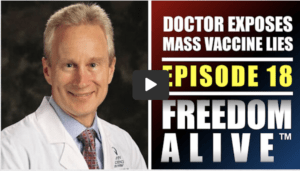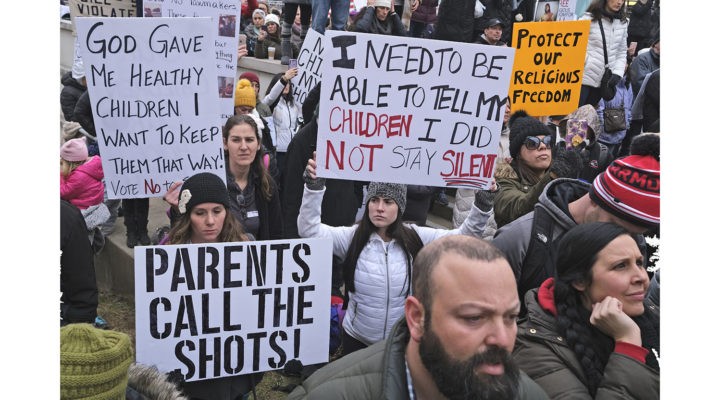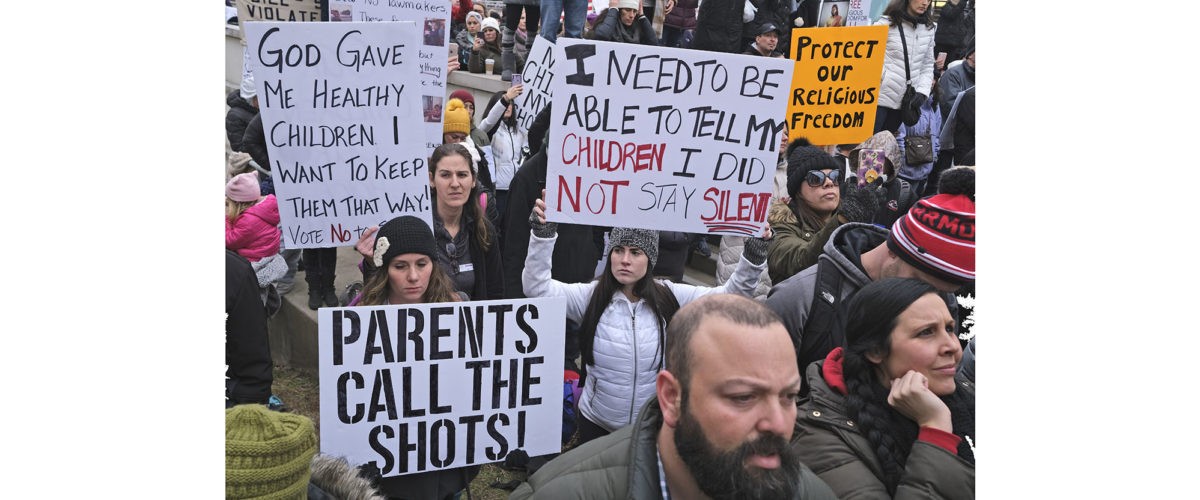Churches in California and North Carolina are among those now offering congregants documentation for “religious exemptions” to the COVID-19 vaccine, a practice that is legally dubious and likely ineffective, according to labor lawyers.
The practice has arisen as more employers and schools issue mandates that employees and students must be vaccinated before returning to work or school. Some of the nation’s largest employers now require vaccination for employees, as do a number of private universities, including some Catholic schools.
Turning political beliefs into religious exemptions
Although opposition to COVID vaccines has been tracked more as a political issue than a religious belief, national polling consistently has shown that conservative evangelical Christians tend to be overly represented among the vaccine hesitant and the vaccine refusers.
With the arrival of vaccine mandates, anti-vaxxers are turning to their religious beliefs as a new justification for refusing vaccination.
With the arrival of vaccine mandates, anti-vaxxers are turning to their religious beliefs as a new justification for refusing vaccination.
Destiny Christian Church in Rocklin, Calif., now offers “religious exemptions” to anyone who asks for them, according to CBS Channel 13 in Sacramento. Pastor Gregg Farrington said his church is pro-freedom, not anti-vaccine, yet he’s been approached by “hundreds of people who feel morally compromised by mandatory vaccination requirements.”
In North Carolina, the Charlotte Observer reported on two congregations handing out religious exemption forms, Freedom House Church, a multi-campus nondenominational church, and the Cathedral of St. Patrick, which is the seat of the Roman Catholic Church in Charlotte.
At Freedom House, Pastor Troy Maxwell said he would write religious exemptions to employers who require vaccinations, the Observer reported. “It is despicable for a business or government agency to force someone to take a vaccine that is unproven, dangerous and not fully tested,” the church said in a statement.
The Cathedral of St. Patrick announced via Facebook that it will offer a sample religious exemption form to parishioners who are seeking a religious exemption to COVID-19 vaccination.
Catholic objectors are defying the pope
For a Catholic congregation to take this step could be considered a direct conflict with the position of the pope and global church leadership.
America magazine, a Catholic journal, published an Aug. 3 article titled, “Do Not Give Religious Exemptions for Covid Vaccines, New York Archdiocese Tells Its Priests.” The article reports that New York’s top Catholic leaders have warned priests: Do not lend legitimacy to the notion that the church supports COVID-19 vaccine exemptions.
“Pope Francis has made it very clear that it is morally acceptable to take any of the vaccines.”
“Pope Francis has made it very clear that it is morally acceptable to take any of the vaccines and said we have the moral responsibility to get vaccinated,” according to a July 30 memo from the Archdiocese of New York to its priests. There is no basis for a priest to issue a religious exemption to the vaccine. By doing so he is acting in contradiction to the directives of the pope and is participating in an act that could have serious consequences to others.”
Evangelical religious liberty group offers advice
Far-right religious liberty groups are rushing to the aid of churches and congregants opposed to vaccination. Liberty Counsel, a conservative evangelical firm that has engaged in spreading conspiracy theories about COVID-19 and the vaccines, has created an entire section of its website to advise individuals how to request a religious exemption from their employer or school.

Screenshot from Liberty Counsel’s website.
The site includes sample language for individuals and pastors and asserts a view of U.S. labor law that is disputed by most other interpreters with relevant legal expertise.
“In the employment context, Title VII prohibits workplace discrimination on the basis of religion. The First Amendment applies to public employers and educational institutions. The current ‘Emergency Use Authorization’ status of all of the COVID shots means that they cannot be mandated,” the site claims.
Neither of those points are accepted widely in the legal community.
The Liberty Counsel site also asserts: “Many of our clients and constituents hold sincere pro-life religious beliefs that prohibit them from participating in or benefiting from an abortion. Some believe that they may not benefit in any way from an abortion, no matter how remote in time that abortion occurred. Others have prayed and asked God whether they should get the COVID shot and have received a clear word from the Lord in their spirit that they must not get the shot. Still others do not feel such a leading; but support the individual believer’s ‘liberty of conscience,’ consistent with the principles outlined in 1 Corinthians 8. There are also those who have recovered from COVID due to healthy immune system God has given them and are themselves protected from getting COVID due to natural immunity, and a reliance upon God’s protection consistent with Psalm 91.”
They “received a clear word from the Lord in their spirit that they must not get the shot.”
Regardless of how sincere any person’s religious belief may be, none of the reasons cited here by Liberty Counsel offer legal protection against vaccine mandates in the workplace or school. And medical professionals, including the U.S. Centers for Disease Control and Prevention, have said repeatedly that carrying antibodies from a previous COVID infection may not offer long-term protection, particularly against the new Delta and Lambda variants.
On the abortion issue, even the pope has told the anti-abortion faithful among his worldwide communion that all the vaccines are morally acceptable. Given that high-level blessing, it is unlikely a court would accept an individual’s assertion of a “religious exemption” to the vaccine based on anti-abortion beliefs.
Religious exemption forms have no legal standing
The exemption forms being produced by some churches and by Liberty Counsel have no legal standing and do not have to be honored by employers or schools, according to lawyers contacted by BNG for confirmation.
The Sacramento CBS affiliate asked labor attorney Mark Spring about the exemption forms, and he explained: “That you can simply say ‘I’m morally compromised,’ or ‘I don’t want to take the vaccine’ and they are going to hand you some form, that would not qualify in my view if challenged or tested by employer or government agency.”
Employers still have a right to reasonably inquire more about the employee’s religious beliefs, for example asking if their religious convictions previously prevented them from taking other vaccinations or preventative care measures. Christian Scientists may be able to present a consistent pattern of denying health care out of religious conviction, but few other religious groups can. If your religious beliefs didn’t keep you from getting a flu shot, they’re not likely to be the real reason you refuse a COVID vaccination.
“Churches should not be handing out these accommodation letters like lollipops.”
Likewise, the Charlotte Observer consulted labor lawyers who also said these forms for religious exemption to COVID vaccination are not likely to be effective.
“These are very unlikely to work,” employment law attorney Sean Herrmann of Herrmann and Murphy told the Observer.
“Churches should not be handing out these accommodation letters like lollipops,” added Joshua Van Kampen of Van Kampen Law.
What the law actually says
Among the workplace laws that relate to this discussion are the Americans with Disabilities Act and Title VII of the Civil Rights Act of 1964. While the Americans with Disabilities Act might provide cover for a medical exemption to vaccination, it is more likely that faith-based appeals for exemption would come through Title VII.
Title VII requires an employer to accommodate an employee’s sincerely held religious belief, practice or observance, unless it would cause an “undue hardship” on the business. Courts previously have said an “undue hardship” is created by an accommodation that has more than a de minimis (very small) cost or burden on the employer.
Possible accommodations could include not requiring the unvaccinated employee to physically enter the workplace, if that is possible with the employee’s type of work. But at the end of the day, an employer’s desire to protect its entire workforce from illness would take precedent over a few employees claiming a religious exemption from vaccination.
Further, if an employee claims a religious exemption but the employer investigates and finds the basis for the request to be something other than religion — such as a political view — the employer has uncontested grounds to deny the request.
Ambiguous religious claims
While many religious beliefs are felt more than being factually provable, the current appeal to religion as an out for COVID vaccination often uses especially vague language.
The current appeal to religion as an out for COVID vaccination often uses especially vague language.
One part of Liberty Counsel’s sample letter for Christians to use with employers or schools says: “It is against my faith and my conscience to commit sin. Sin is anything that violates the will of God, as set forth in the Bible, and as impressed upon the heart of the believer by the Holy Spirit. In order to keep myself from sin, and receive God’s direction in life, I pray and ask God for wisdom and direction daily. As part of my prayers, I have asked God for direction regarding the current COVID shot requirement. As I have prayed about what I should do, the Holy Spirit has moved on my heart and conscience that I must not accept the COVID shot. If I were to go against the moving of the Holy Spirit, I would be sinning and jeopardizing my relationship with God and violating my conscience.”
The group also advises pastors in their letters on behalf of parishioners to write that the person “has told me that based on his review of Centers for Disease Control guidance and position statements, and understanding of the issues, and much prayer that he might discern truth from error, and whether he should get the shot, the Holy Spirit is not allowing him to accept the COVID shot. He believes that if he were to do so, he would be sinning against our living God. Our church supports him as he follows the leading of the Holy Spirit and supports his request for a religious exemption.”
Likewise, in Louisiana USA Today reports that Attorney General Jeff Landry created a form for those who object to mask and vaccine mandates, allowing them to assert, for example, that they do not consent to “forcing a face covering on my child, who is created in the image of God.”
“I believe that our body is the temple of the Holy Spirit and that I am called to honor God in how I care for my body,” the form states.
Related articles:
Get ready for more claims of ‘religious exemptions’ to vaccine mandates
A pediatrician’s advice to parents worried about the COVID vaccine and their children
Francis Collins: ‘Give God the glory’ for vaccines ‘but roll up your sleeve’
6 things you should know about the COVID vaccine | Opinion by Christy Edwards and Jen Dilts


